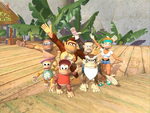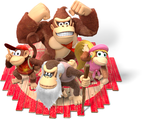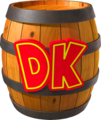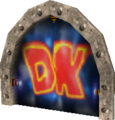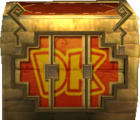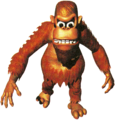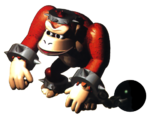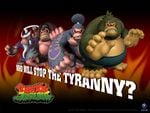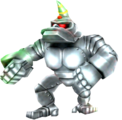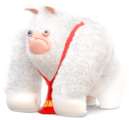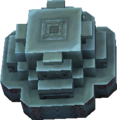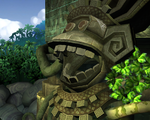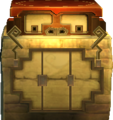Kong: Difference between revisions
m (Text replacement - "(\| *publisher *= *Nintendo[^\n}]*)(\| *author *= *Nintendo)([\|}])" to "$1$3") |
No edit summary |
||
| Line 11: | Line 11: | ||
'''Kongs''' (also known as '''Apes''' in production literature for the [[Donkey Kong Country (television series)|''Donkey Kong Country'' television series]])<ref>{{cite|title=''Computer Animation: A Whole New World''|date=1998|publisher=Rockport Publishers|page=87|isbn=1564963772}}</ref> are sapient primates that make up much of the cast of the ''[[Donkey Kong (franchise)|Donkey Kong]]'' franchise, with the [[Donkey Kong|eponymous character]] himself being one. They are capable of actions such as speech and building houses and typically wear clothing, though the amount varies drastically with the individual, with Donkey Kong himself wearing only a tie, while many others wear full outfits. Kongs seem to be native to [[Donkey Kong Island]], and they share an animosity with much of the crocodilian [[Kremling]] race. While most of them share the surname "Kong," they do not all appear to be directly related to one another. Kongs can resemble any number of real-life primates, with Donkey Kong, [[Funky Kong]], and several others resembling gorillas; [[Diddy Kong]] resembling a monkey; [[Dixie Kong]] and [[Tiny Kong]] resembling chimpanzees; and [[Lanky Kong]] resembling an orangutan. | '''Kongs''' (also known as '''Apes''' in production literature for the [[Donkey Kong Country (television series)|''Donkey Kong Country'' television series]])<ref>{{cite|title=''Computer Animation: A Whole New World''|date=1998|publisher=Rockport Publishers|page=87|isbn=1564963772}}</ref> are sapient primates that make up much of the cast of the ''[[Donkey Kong (franchise)|Donkey Kong]]'' franchise, with the [[Donkey Kong|eponymous character]] himself being one. They are capable of actions such as speech and building houses and typically wear clothing, though the amount varies drastically with the individual, with Donkey Kong himself wearing only a tie, while many others wear full outfits. Kongs seem to be native to [[Donkey Kong Island]], and they share an animosity with much of the crocodilian [[Kremling]] race. While most of them share the surname "Kong," they do not all appear to be directly related to one another. Kongs can resemble any number of real-life primates, with Donkey Kong, [[Funky Kong]], and several others resembling gorillas; [[Diddy Kong]] resembling a monkey; [[Dixie Kong]] and [[Tiny Kong]] resembling chimpanzees; and [[Lanky Kong]] resembling an orangutan. | ||
Generic names of various real-life types of primates, such as "monkeys," "chimps," "gorillas," and "apes," are used fairly interchangeably to describe Kongs, especially in earlier media such as ''[[Saturday Supercade]]'' and the ''Donkey Kong Country'' cartoon, which never refer to Kongs as such outside their individual names. However, the term "baboon" seems to be reserved as an insult, potentially due to it sounding similar to the word "buffoon," and is even used against other species, such as [[Cranky Kong]] using it against [[ | Generic names of various real-life types of primates, such as "monkeys," "chimps," "gorillas," and "apes," are used fairly interchangeably to describe Kongs, especially in earlier media such as ''[[Saturday Supercade]]'' and the ''Donkey Kong Country'' cartoon, which never refer to Kongs as such outside their individual names. However, the term "baboon" seems to be reserved as an insult, potentially due to it sounding similar to the word "buffoon," and is even used against other species, such as [[Cranky Kong]] using it against [[Krusha]] in "[[From Zero to Hero]]." Despite this, Kongs are their own species separate from apes.<ref>{{cite|author=KRoolKountry|date=January 15, 2024|url=x.com/KRoolKountry/status/1747120247826702486|title=Just a reminder that Donkey Kong is not an ape—he is a Kong. However, “going ape” is a phrase that can be used for Kongs as well!|publisher=X|accessdate=February 15, 2024}}</ref> | ||
The word "Kong" is a Japanese slang word for "gorilla."<ref>{{cite|author=De Maria, Rusel, and Wilson, Johnny L.|date=December 18, 2003|title=''High Score!: The Illustrated History of Electronic Games''|format=2nd edition|location=New York|publisher=McGraw-Hill/Osborne|isbn=9780072231724|language=en}}</ref> | The word "Kong" is a Japanese slang word for "gorilla."<ref>{{cite|author=De Maria, Rusel, and Wilson, Johnny L.|date=December 18, 2003|title=''High Score!: The Illustrated History of Electronic Games''|format=2nd edition|location=New York|publisher=McGraw-Hill/Osborne|isbn=9780072231724|language=en}}</ref> | ||
Revision as of 18:01, August 7, 2024
It has been requested that this article be rewritten. Reason: Include better coverage of The Super Mario Bros. Movie
| Kong | |||
|---|---|---|---|
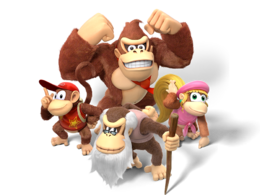 The main Kongs of Donkey Kong Country: Tropical Freeze: clockwise from top, Donkey Kong, Dixie Kong, Cranky Kong, and Diddy Kong The main Kongs of Donkey Kong Country: Tropical Freeze: clockwise from top, Donkey Kong, Dixie Kong, Cranky Kong, and Diddy Kong
| |||
| First appearance | Donkey Kong (1981) | ||
| Latest appearance | Nintendo World Championships: NES Edition (2024) | ||
| |||
| |||
| |||
- “I'm the king of the Kong, the simian Don Juan.”
- —Diddy Kong, "Kong for a Day"
Kongs (also known as Apes in production literature for the Donkey Kong Country television series)[1] are sapient primates that make up much of the cast of the Donkey Kong franchise, with the eponymous character himself being one. They are capable of actions such as speech and building houses and typically wear clothing, though the amount varies drastically with the individual, with Donkey Kong himself wearing only a tie, while many others wear full outfits. Kongs seem to be native to Donkey Kong Island, and they share an animosity with much of the crocodilian Kremling race. While most of them share the surname "Kong," they do not all appear to be directly related to one another. Kongs can resemble any number of real-life primates, with Donkey Kong, Funky Kong, and several others resembling gorillas; Diddy Kong resembling a monkey; Dixie Kong and Tiny Kong resembling chimpanzees; and Lanky Kong resembling an orangutan.
Generic names of various real-life types of primates, such as "monkeys," "chimps," "gorillas," and "apes," are used fairly interchangeably to describe Kongs, especially in earlier media such as Saturday Supercade and the Donkey Kong Country cartoon, which never refer to Kongs as such outside their individual names. However, the term "baboon" seems to be reserved as an insult, potentially due to it sounding similar to the word "buffoon," and is even used against other species, such as Cranky Kong using it against Krusha in "From Zero to Hero." Despite this, Kongs are their own species separate from apes.[2]
The word "Kong" is a Japanese slang word for "gorilla."[3]
Kong Family

The Kong Family[4] (alternatively Kong family),[5] also known as the Donkey Kong Family[6] or Kong Klan,[7] and the DK Crew[8][9] (alternatively DK Krew)[10] are the main group of Kongs, being Donkey Kong's family and close friends. The patriarch of the family is Cranky Kong, the original Donkey Kong. In the Donkey Kong franchise of video games, members of the Kong Family are either playable characters or supporting characters that aid the main heroes on their journey, although they also receive help from allies outside the family, including the Animal Friends and the Kremling K. Lumsy.
The family often uses the initials "DK" as a symbol, which most often represents Donkey Kong. It is seen on Donkey Kong's tie, DK Barrels, DK Coins, the Level Flags, DK Spaces, and various other objects around Donkey Kong Island. The symbol is also used in the Super Smash Bros. series, although in this context, it is used as the logo for the Donkey Kong franchise in general instead of just the Kong Family members (since King K. Rool and Klaptraps also use it).
According to Gregg Mayles, the characters were loosely intended to be an actual family, but the extended relations were left deliberately vague by the release of Donkey Kong Country due to uncanny details such as Diddy Kong having a tail and Candy Kong looking humanoid, as more priority was put in diversifying the designs rather than fitting it into a cohesive family tree background.[11]
Names in other languages
| Language | Name | Meaning | Notes |
|---|---|---|---|
| Japanese | コングファミリー[?] Kongu Famirī |
Kong Family | |
| Catalan | Família Kong (The Super Mario Bros. Movie)[?] | Kong Family | |
| Chinese (simplified) | 刚家族[?] Gāng Jiāzú |
Kong Family | |
| Chinese (traditional) | 剛家族[?] Gāng Jiāzú |
Kong Family | |
| French | Famille Kong[?] | Kong Family | |
| German | Kong-Familie[?] | Kong Family | |
| Italian | Famiglia Kong[?] | Kong Family | |
| Spanish | Familia Kong[?] | Kong Family |
List of Kongs
Donkey Kong's family
- Cranky Kong's great grandfather – Was said to have once owned an antique mirror in Donkey Kong Country 3: Dixie Kong's Double Trouble![12]
- Cranky Kong – The original Donkey Kong, the paternal figure of Donkey Kong Jr. and Donkey Kong, Wrinkly Kong's husband.
- Donkey Kong Jr. – The son of the original Donkey Kong.
- Donkey Kong – The current Donkey Kong, Cranky Kong's descendant.
- Baby DK – The younger version of Donkey Kong in Yoshi's Island DS.
- Baby Kong – The younger version of Donkey Kong in the Ape Foo Young episode of the Donkey Kong Country television series.
- Diddy Kong – Donkey Kong's sidekick and Dixie Kong's boyfriend.
- Wrinkly Kong – Cranky Kong's late wife. She appeared alive prior to Donkey Kong 64; from then onwards, she has been deceased and appears as a spirit.
In addition, Donkey Kong Jr. has a relative referred to as Uncle Julius, albeit he has not been shown to be a part of the Kong clan.
Dixie Kong's family
- Dixie Kong – Diddy Kong's girlfriend, Tiny Kong's older sister, Kiddy and Chunky Kong's cousin.
- Tiny Kong – Dixie Kong's younger sister, Kiddy and Chunky Kong's cousin.
- Chunky Kong – Kiddy Kong's older brother, Dixie and Tiny Kong's cousin.
- Kiddy Kong – Chunky Kong's younger brother, Dixie and Tiny Kong's cousin.
Other members
- Baby Kong – A baby that was under the care of Candy Kong and Dixie Kong in the Baby Kong Blues episode of the Donkey Kong Country television series.
- Bink – A deceased Kong-like character in Mario & Luigi: Superstar Saga. In the Nintendo 3DS remake, his appearance is the same as the rest of the skeleton sailors of the S.S. Chuckola.
- Bluster Kong – A rich arrogant Kong that runs Bluster Barrelworks on Kongo Bongo Island.
- Leo Luster – Bluster's alter-ego from the Hunka Hunka Burnin' Bluster episode of the Donkey Kong Country television series.
- Candy Kong – Donkey Kong's rumored girlfriend.
- The driver – A Kong that takes Mario, Princess Peach, and Toad to Cranky Kong's lair in The Super Mario Bros. Movie.
- Eddie the Mean Old Yeti – A Kong that lives in the mountains of Kongo Bongo Island.
- Funky Kong – Donkey Kong's friend.
- Junior (II) – A pink variant of Donkey Kong Jr.
- Kong Fu – A Kong that challenges Donkey Kong in the television show.
- Lanky Kong – An orangutan whose relationship to the other Kongs is unknown.[13][14]
- Mini Donkey Kong – A Kong that signifies an alarm.
- Monkey Kong – An implied Kong chosen to lead the Federation of Future Rulers.
- Rabbid Cranky – A Rabbid/Cranky Kong cross-creation.
- Ringo – A cartoonist friend of Donkey Kong appearing in the Donkey Kong Jungle Action Special.
- Super Kong – A powerful version of Donkey Kong that appears to help the player get through levels. Super Kong also has the ability to get a white-furred Diddy Kong as a partner.
- Swanky Kong – A Kong that hosts a game show and is very fashionable.
- Poppa – An implied Kong who is the father of Sonny who disappeared.
- Uncle Kong – A Kong similar in appearance to Bluster described as "Diddy's uncle" who gives various tips in JK Voice's Super Donkey Kong 2: Dixie & Diddy strategy book.
- Various generic, unnamed Kong characters seen at the starting line of DK Jungle and Bananan Labyrinth in Mario Kart Arcade GP DX.
- Various generic, unnamed Kong characters in The Super Mario Bros. Movie, including the Kong army.
Evil Kongs
- Dread Kong – A member of the Kong boss group.
- Ghastly King, a.k.a. Cactus King – The leader of the Kong boss group.
- Karate Kong – A member of the Kong boss group.
- Ninja Kong – A member of the Kong boss group.
- Rabbid Kong – A Rabbid/Kong cross-creation.
- Mega Rabbid Kong – Rabbid Kong's corrupted alter-ego.
- Sumo Kong – A member of the Kong boss group.
Robotic Kongs
- Candy Clone – A robotic version of Candy Kong under the control of King K. Rool in the Donkey Kong Country television series.
- Cannon Kong – Donkey Kong's robot from the Mario vs. Donkey Kong series.
- Capture Kong – Donkey Kong's robot from the Mario vs. Donkey Kong series.
- Catapult Kong – Donkey Kong's robot from the Mario vs. Donkey Kong series.
- Circus Kong – Donkey Kong's robot from the Mario vs. Donkey Kong series.
- Cool Kong – Donkey Kong's robot from the Mario vs. Donkey Kong series.
- Crash Kong – Donkey Kong's robot from the Mario vs. Donkey Kong series.
- Cyber Kong – Robotic Kong enemies that can shoot lasers from Donkey Kong Barrel Blast.
- Kongā – Donkey Kong's robot from the Mario vs. Donkey Kong series.
- Mini Diddy Kong – A toy made by the Mario Toy Company.
- Mini Donkey Kong – A toy made by the Mario Toy Company.
Kong species
- Guerrilla – Enemies from Super Mario RPG: Legend of the Seven Stars that have an uncanny resemblance to Donkey Kong.
- Chained Kong – A stronger variant of Guerrillas, from Super Mario RPG: Legend of the Seven Stars.
- Manky Kong – Enemies from Donkey Kong Country that are described as "Kong reject orangutans."[15]
- Uckykong – Enemies from Yoshi's Crafted World that are a hybrid between a Ukiki and a Kong.
- Snow Ucky Kong – A snow variant of the Uckykongs, from Yoshi's Crafted World.
Unused Kongs
- An unnamed, hatted Kong. – Donkey Kong Land
- An unnamed Kong with dark fur and glowing red eyes. He was replaced by Dread Kong in the final game. – Donkey Kong Jungle Beat
- The Helper Monkeys from an earlier build. – Donkey Kong Jungle Beat
- Redneck Kong, also known as "Crappy Kong." He was replaced by Candy Kong in the later build. – Diddy Kong Pilot
- An unnamed Kong genie referred to as the "Ultimate Magic Man" by unused text. He would have been the final boss of the unfinished story mode "K. Rool's Gold."[16] — Diddy Kong Pilot
Gallery
Kong Family
Group
The Kongs of Donkey Kong Country. From left to right: Funky Kong, Diddy Kong, Candy Kong, Donkey Kong, and Cranky Kong.
The Kongs of Donkey Kong Country 2. From left to right: Diddy Kong, Donkey Kong, Dixie Kong, Funky Kong, Cranky Kong, Wrinkly Kong, and Swanky Kong.
The Kongs of Donkey Kong Country 3. From left to right: Kiddy Kong, Diddy Kong, Donkey Kong, Cranky Kong, Dixie Kong, and Wrinkly Kong.
The main Kongs featured in the game Donkey Kong 64. From left to right: Diddy Kong, Lanky Kong, Donkey Kong, Chunky Kong, and Tiny Kong.
The main Kongs in the Donkey Kong Country TV show. Clockwise from top left: Funky Kong, Donkey Kong, Bluster Kong, Candy Kong, Cranky Kong, Diddy Kong, and Dixie Kong.
The Kongs of Donkey Kong Country: Tropical Freeze
An audience of Kongs in The Super Mario Bros. Movie
Emblem
Other Kongs
A Manky Kong, from Donkey Kong Country
Artwork of a Chained Kong, visually identical to a Guerrilla, from Super Mario RPG: Legend of the Seven Stars
Bink from Mario & Luigi: Superstar Saga, a skeletal Kong found in the Beanbean Kingdom
The main Kong bosses from Donkey Kong: Jungle Beat (from left to right: Karate Kong, Dread Kong, Ninja Kong, and Sumo Kong)
A Cyber Kong, from Donkey Kong Barrel Blast
The starting line of DK Jungle in Mario Kart Arcade GP DX, with two unknown Kongs cheering at the sides
Rabbid Kong from Mario + Rabbids Kingdom Battle, a Rabbid/Donkey Kong hybrid
Rabbid Cranky from Mario + Rabbids Kingdom Battle, a Rabbid/Cranky Kong hybrid
Miscellaneous
Volcano statues
Trivia
- In Donkey Kong's character poster for The Super Mario Bros. Movie set in the Great Ring of Kong, in addition to depicting Diddy Kong, Dixie Kong, Swanky Kong, and Cranky Kong, there are also several other unnamed Kongs, including one who wears sunglasses that resembles Funky Kong.
References
- ^ 1998. Computer Animation: A Whole New World. Rockport Publishers. ISBN 1564963772. Page 87.
- ^ KRoolKountry (January 15, 2024). Just a reminder that Donkey Kong is not an ape—he is a Kong. However, “going ape” is a phrase that can be used for Kongs as well!. X. Retrieved February 15, 2024.
- ^ De Maria, Rusel, and Wilson, Johnny L. (December 18, 2003). High Score!: The Illustrated History of Electronic Games (2nd edition). New York: McGraw-Hill/Osborne (English). ISBN 9780072231724.
- ^ 1995. Donkey Kong Country 2: Diddy's Kong Quest Instruction Booklet. Nintendo of America (American English). Page 21.
- ^ "Have you been to see the other members of the Kong family? They're not as useful as me of course, but they might be able to help." – Cranky Kong. Donkey Kong Country 2: Diddy's Kong Quest.
- ^ 1994. Donkey Kong Country Player's Guide. Nintendo of America (American English). Page 5.
- ^ Munson, Terry and Paul Shinoda (1996). Donkey Kong Country 3: Dixie Kong's Double Trouble! Player's Guide. Nintendo of America (American English). Page 8.
- ^ "He's the first member of the DK crew!" – DK Rap singer. Donkey Kong 64.
- ^ "The DK Crew came to his tropical paradise for a little R&R." – Narrator. DK: Jungle Climber.
- ^ The back of the box art for Donkey Kong Country 2 for the Game Boy Advance.
- ^ GameXplain (November 16, 2019). Talking with Rare's Creative Director for DKC's 25th Anniversary! (Cut Content, Wario Plot, & More) (27:06). YouTube (English). Retrieved June 3, 2024.
- ^ "Yes, but it's no ordinary one though! It was Cranky's great grandfather's! I can't let it go for less than 50 coins." – Bazaar. Donkey Kong Country 3: Dixie Kong's Double Trouble!.
- ^ "A newcomer to the Kong clan and the joker of the pack. I haven't a clue whom he's related to—must be some distant cousin or something." – Cranky Kong (1999). Donkey Kong 64 instruction booklet. Nintendo of America. Page 8.
- ^ "The well-mannered giant gorilla is, in the truest sense of the word, a great guy, and sticks to Lanky, his uncle once-removed." – Chunky Kong bio. German Donkey Kong 64 website.
- ^ 1994. Donkey Kong Country instruction booklet. Nintendo of America (American English). Page 29.
- ^ Proto:Banjo-Pilot/Diddy Kong Pilot 2001 § Story Text. The Cutting Room Floor. Retrieved April 23, 2024.
| Kongs | |
|---|---|
| Kong characters | |
| Baby Kong • Bink • Bluster Kong (Leo Luster) • Candy Clone • Candy Kong • Chunky Kong • Cranky Kong (Young) • Cranky Kong's great grandfather • Diddy Kong • Dixie Kong • Donkey Kong (Baby, Robot) • Donkey Kong Jr. • Dread Kong • Driver • Eddie • Funky Kong • Ghastly King • Karate Kong • Kiddy Kong • Kong Fu • Lanky Kong • Mecha Donkey Kong • Mini Donkey Kong (Game & Watch) • Monkey Kong • Ninja Kong • Rabbid Cranky • Rabbid Kong (Mega) • Ringo • Snow Kong • Sumo Kong • Super Kong • Swanky Kong • Tiny Kong • Uncle Kong • Wrinkly Kong | |
| Kong species | |
| Chained Kong • Cyber Kong • Guerrilla • Helper Monkey • Kong • Manky Kong • Mini Diddy Kong • Mini Donkey Kong (toy) • Ninjape • Snow Ucky Kong • Uckykong | |
| Donkey Kong's robots | |
| Cannon Kong • Capture Kong • Catapult Kong • Circus Kong • Cool Kong • Crash Kong • Kongā | |
| Kong groups | |
| Donkey Kong's robots • Kong (boss group) • Kong Family | |




